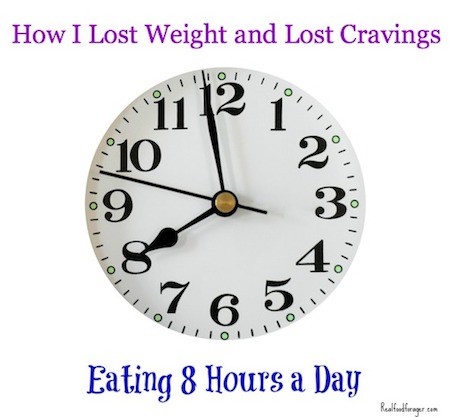I have been reading about intermittent fasting for a while now and I finally decided it was time to try it. I was feeling stuck and in a rut with my weight and was having trouble with cravings and simply eating too much. So right after Thanksgiving I started to practice intermittent fasting. I’ll tell you how I lost 6 pounds in 4 weeks, lost all the cravings for sugar and carbs and saved my digestive system!
I purposely choose to start this protocol during the most difficult time of the year — the holidays — because I just wasn’t feeling my best and I knew it was because I was several pounds over my desired weight. If I let things go, I could have gained another few pounds just because of all the food around. I didn’t want to put it off until the new year.
I already eat grain-free and low carb but I was relying on nuts to fill the gap. Not a good idea. Nuts — and they must be properly prepared by soaking and dehydrating — are great for a small snack or to use in a recipe, but as an everyday food item they can become addicting. They did with me.
In his book, A life Unburdened, Richard Morris specifically stated that he had to hide the crispy nuts in order to help lose the amount of weight he needed to lose. He was eating Weston Price recommended foods and he did lose the weight — but without the nuts.
Clearly, you can be eating a nourishing real food diet and still be overweight because of other issues, like too many nuts or too many carbs, or not enough exercise, hormonal issues, etc. Taking the many variables into consideration, I think intermittent fasting can be beneficial for many people.
What is Intermittent Fasting?
There has been much written about intermittent fasting (IF) and there are several ways to do it. Dr. Michael Mosley, in his book The Fast Diet: Lose Weight, Stay Healthy, and Live Longer with the Simple Secret of Intermittent Fasting advocates fasting two days a week and eating normally the rest of the time.
In their book, The 8-Hour Diet: Watch the Pounds Disappear Without Watching What You Eat!, David Zinczenko and Peter Moore advocate the 8 hour window of time during the day when you can eat and the rest of the time you are not eating.
This works out to be a 16 hour block of time to fast. For most people it is convenient to skip breakfast and eat at lunchtime. This works for me. I typically stop eating at 8:00 or 8:30 in the evening and then eat at 12:00 or 12:30 the next day.
It’s not as hard as it sounds. If you are engaged in work or some other activity, hunger pangs will come and go and it is easy to ignore them. I found the hardest time was when I had to do work at the computer all morning. However, there is a solution to that.
The “Bullet”
One way to get you through the fast is to hack it with bulletproof coffee (some folks just can’t give up their morning coffee) — coffee with a tablespoon of coconut oil. Coconut oil is a medium chain triglyceride (fat) that is used immediately for energy and will not disrupt the fast. Some folks also add a tablespoon of grassfed ghee or butter. I believe that caffeine is really not good for the adrenals, but some folks seem to handle it. See more about bulletproof fasting here as popularized by Dave Asprey.
The “Rocket”
I am not a coffee drinker and I don’t want caffeine, so I took to making a cup of Rooibos Chai Tea (amazing!) with a tablespoon of coconut cream (from the top of this can). This is not technically as much coconut oil, but it is fat with a tiny drop of sugar and it has not seemed to disrupt the physiology of the fast for me. You can also add a tablespoon of grassfed ghee or butter as they do with the bulletproof coffee. Mixing with an immersion blender combines the fats so that you don’t have an oil slick to sip through.
I’m christening this drink “The Rocket”. It is entirely satisfying and actually fills me up. Importantly, it gets me through the fast. If you don’t mind oil in your tea, then by all means use the coconut oil instead.
The Research
In the 8 Hour Diet, Zinczenko relies on the studies of two scientists: Satchidananda Panda, PhD of the Salk Institute and Mark Mattson, PhD, Chief of the Laboratory of Neurosciences at the U.S. National Institute on Aging (NIA).
Dr. Panda
In this study published in the Proceedings of the National Academy of Sciences (PNAS) in 2009, Dr. Panda’s group used wild and circadian deficient mice to study the relationship of liver gene expression to fasting and feeding cycles. What does liver gene expression have to do with fasting?
The researchers found a relationship between the pattern of food intake and hepatic transcription (i.e. gene expression, RNA synthesis) — and concluded:
If feeding time determines the activity of a large number of genes completely independent of the circadian clock, when you eat and fast each day will have a huge impact on your metabolism. (My emphasis)
What this means is that the window of time in which you are eating, is just as important –maybe even moreso — as what you are eating.
Dr. Mattson
In this review published in Cell Metabolism in 2012, Dr. Mattson reviews the subject of changes in the brain at a cellular and molecular level during aging. He has been a proponent of calorie restriction and intermittent fasting as a way to reverse some of the changes that aging causes.
He acknowledges that the health benefits of IF have not been studied in normal weight people, only in overweight/obese animals and human subjects. Therefore, the potential health benefits of intermittent fasting for normal-weight subjects remain to be determined.
In his book, Zinczenko makes much more of the research of these two scientists then they do (and Zinczenko does not supply references). Additionally, Zinczenko claims that you can lose weight automatically just by restricting your eating to 8 hours — no matter what you eat. I don’t think that is true at all and there are no studies that show that.
He goes on to say that some foods are better than others and he outlines 8 foods specifically. I do not agree with his 8 superfood choices. He is on the lean meats bandwagon that most diet writers still subscribe to and he gives poor information about which fats are good — listing canola oil as a good fat. Harumph!
That’s when I put the book down.
However, that did not deter me from trying the diet as outlined by others who I do trust such as Dr. Paul Jaminet. In The Perfect Health Diet, Dr. Jaminet also advocates intermittent fasting. These are the reasons that are backed by science.
The Concept of Autophagy
Autophagy is “self eating”. This is the way our body kills pathogens that are inside the cells. The white blood cells kill pathogens that are circulating around in the blood or in the extracellular fluids. But how does the body kill the pathogens that are inside the cells? There are cell structures called lysosomes that recycle cellular junk — and recyle the important and useful fatty acids, amino acids and sugars for reuse.
When these basic nutrients are plentiful (as after a meal) autophagy is suppressed. However, it has been found that after only a short fast (less than 24 hours) autophagy is upregulated. This is a good thing and a benefit to intermittent fasting.
According to Dr. Jaminet a reasonable window for fasting is 16 hours — hence the 8 hour window for eating. Animal studies have shown that the 8 hour window for eating “delivers significant health benefits.” (PHD p. 362)
Limited Studies in Humans
There are limited studies in humans, most of them in obese individuals. However, this review study published in the Revista da Associação Médica Brasileira in 2013 found that animal models have shown positive changes in glucose (lower plasma glucose and insulin levels) and in lipid metabolism (reduced visceral fat tissue and increased plasma adiponectin level), and an increased resistance to stress.
Furthermore, in human studies they found that,
IF is reported to improve the lipid profile; to decrease inflammatory responses, reflected by changes in serum adipokine levels; and to change the expression of genes related to inflammatory response and other factors. Studies on obese individuals have shown that patient compliance was greater for IF than other traditional nutritional approaches (calorie restriction).
They conclude that further research is necessary to test the effectiveness of IF in preventing and controlling metabolic and cardiovascular diseases.
I hope they get on with it.
This study published in 2011, titled, Impact of caloric and dietary restriction regimens on markers of health and longevity in humans and animals: a summary of available findings concluded that many human Calorie Restriction studies have noted favorable changes in biomarkers related to cardiovascular and glucoregulatory function, which likely relate to quality of life and may relate to longevity.
How I Saved My Digestive System
For me, in the 4 weeks that I have been practicing Intermittent Fasting everyday (with the exception of one or two days over the 4 week period in which I ate normally), I have found the following benefits:
1- Fat loss and better muscle tone. I’ve lost 6 pounds — those 6 pounds that put me over the edge and have been very difficult for me to lose. It doesn’t sound like a lot but for a small person it makes a big difference. I hope to continue to loss a few more pounds and keep it off.
I believe the intermittent fasting has helped my body learn how to burn fat. I am on a grain-free diet, but it is not ketogenic at this point, yet I am clearly burning fat.
2- I feel more focused. My brain seems to be working better most of the time.
3- I do not have the cravings to the extent I did — I still eat small amounts of fruit or treats but only during my 8 hour window.
4- The most important benefit I can say at this point is that my digestion is a lot better for having a long rest period. I think this is extremely important to good health.
Eating at night is against the natural order of things. Nighttime is for resting — organ systems included. People who overeat may tend to eat too much at night and this is yet another stress on the digestive system.
My goal is to stop eating by 7:30 but it usually turns out to be 8:00 or 8:30. That still works out — I can then eat at 12:00 or 12:30 which suits my schedule just fine.
Intermittent is Not For Everyone
Stefani Ruper at Paleo for Women has written a very involved article about why some women on Paleo diets do not do well with intermittent fasting. It’s worth reading if you fall into this category, or not.
Fasting, and even this modified intermittent fasting should not be practiced if you are pregnant or nursing, or if you have sugar control problems, diabetes or other metabolic conditions or known adrenal problems. As with any change in your diet you should seek the advice of your personal health care provider. See my disclaimer.
What about you? Have you tried Intermittent Fasting or another fasting protocol? How has it worked for you?











